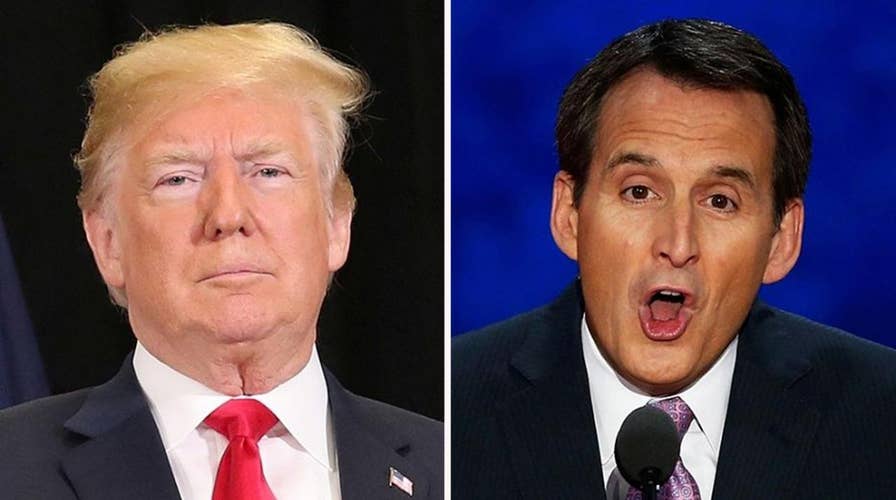Trump-critic Pawlenty loses Minnesota GOP primary
Tim Pawlenty loses Minnesota GOP gubernatorial primary to County Commissioner Jeff Johnson. Griff Jenkins reports from Washington, D.C.
Tuesday’s Republican primaries brought good news for President Trump and consolidated his hold over the Republican Party. The stunning upset victory of Jeff Johnson over former Gov. Tim Pawlenty in the Minnesota Republican gubernatorial primary drives that point home better than almost anything else.
Pawlenty outspent Hennepin County Commissioner Johnson by better than three-to-one and was heavily favored to win the primary to run for his old job again.
But Johnson was more conservative and was the stronger supporter of President Trump – and that apparently was important to Republican primary voters. Johnson captured 53 percent of the vote to 44 percent for Pawlenty in the gubernatorial primary, with a minor candidate picking up the rest.
When Trump was running in 2016 Pawlenty called him “unhinged and unfit” to be president, after the “Access Hollywood” tape showed Trump bragging about grabbing women. Pawlenty later said he had voted for Trump in the 2016 election and supported most of his policies, but was never seen as a strong backer of the president.
“The Republican Party has shifted,” Pawlenty said Tuesday night. “It is the era of Trump, and I’m just not a Trump-like politician.”
Pawlenty was also vulnerable because after his failed bid for the 2012 GOP presidential nomination he became a Washington lobbyist for one of the nation’s largest banks – not exactly a popular profession at a time when Trump and his supporters have adopted the slogan “drain the swamp.”
President Trump congratulated Johnson in a tweet Wednesday, writing: “Jeff Johnson of Minnesota had a big night in winning the Republican nomination for Governor against a very strong and well known opponent! Thanks for all of the support you showed me. You have my complete and total Endorsement. You will win in November!”
More evidence of President Trump’s dominance over his party came in the resolution of an election from last week where Trump-backed Kansas Secretary of State Kris Kobach was finally certified as the Republican nominee for governor Tuesday.
Kobah won the nomination over Republican Gov. Jeff Colyer after provisional ballots were counted.
If nothing else, primary results this year show that the Trump wing of the Republican Party is indeed triumphant. The establishment wing has taken defeat after defeat.
What’s unknown is what impact support from the president will have for GOP candidates in the November election, at a time when he is deeply unpopular with Democratic voters and many independents are cool to him.
On the Democratic side, Tuesday’s primaries tell a more mixed story. If nothing else, Democratic voters chose a diverse group of candidates who will try to showcase broad general-election appeal.
As has been widely reported, the Democrats have nominated the first transgender candidate to ever run for governor in the U.S. – Christine Hallquist in Vermont. They also nominated Ilhan Omar in Minnesota for a U.S. House seat that she is favored to win, which would make her the first Somali-American elected to Congress.
U.S. Rep. Keith Ellison, the prominent Muslim and deputy chairman of the Democratic National Committee, was also nominated for Minnesota attorney general, despite a recent allegation of domestic abuse by his ex-girlfriend.
The diversity of the Democratic ticket on balance is probably a good thing for the party. Yet, it underscores the divisions that exist on ideology, messaging and strategy.
Put another way, as the primary season nears a close, the Republicans face a fundamental challenge of articulating a reason why they should maintain control of the House.
The Democrats face their own set of challenges that require a campaign message going forward to unite the disparate factions of their party – between the moderates, the progressives and underrepresented groups that have not traditionally been part of the mainstream conversation.
The Republicans have yet to articulate a clear message on the economy; the Democrats have yet to articulate a clear message at all, aside from the unsatisfying “stand up to and resist Donald Trump”.
How the November elections go both for Congress and state offices around the country will be determined by whether both parties in their own way will be able to come to coherent and cogent messages. These message will have to resonate with an electorate that on both sides is angry, polarized, divided and frustrated with the lack of progress and coherence in its political leaders at all levels.

